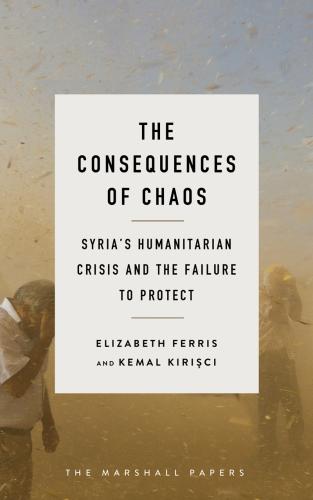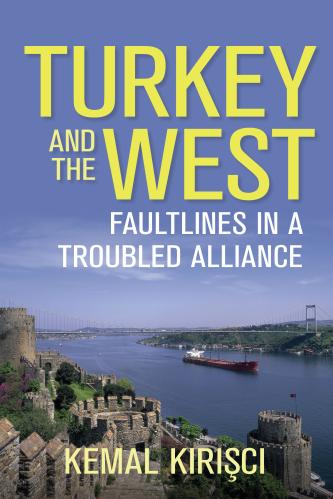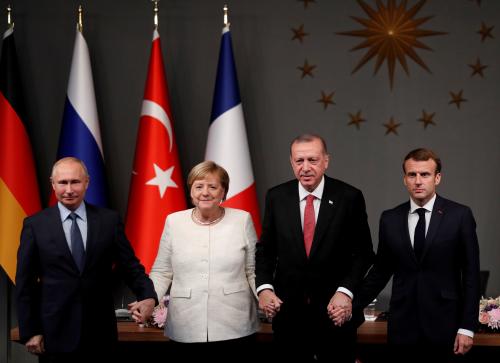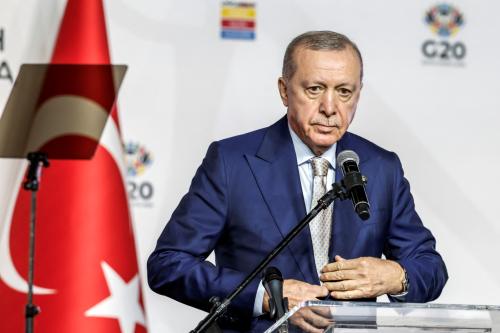The Syrian crisis is entering its eighth year and shows no sign of ending. More than 3.6 million Syrians have sought refuge in Turkey, which now hosts the largest number of refugees worldwide.
As the conflict in Syria continues—and as doors around the world close—neither return nor resettlement appear to be realistic, durable solutions for Syrians in Turkey. “They are here to stay for the foreseeable future,” said a former senior government official, quite bluntly. Although, according to the Turkish government, about 292,000 Syrians (as of the end of 2018) have returned to their home country, the majority of Syrians in Turkey will stay there.
How the Turkish government and the international community tackle the task of integrating Syrian refugees into society—and crucially, the labor market—will go far to shape the country’s future. So too for the European Union, whose politics were upended by the sudden onset of large number of Syrian refugee arrivals in 2015.
Those interested in developing new schemes should consider whether employing Syrian refugees in large-scale agricultural projects in Turkey could be incentivized by preferential trade access to European markets for products involving Syrian labor.
Syrians and the labor market in Turkey
Developing schemes that can help move Syrian refugees into the formal economy while creating opportunities for local residents is a promising way forward. Despite the widespread misconception that refugees are an economic drain, research shows limited effects on the employment and income of workers in the countries that host them. Refugees can even become net contributors.
In 2016, the Turkish government enabled Syrian refugees to obtain formal work permits. That was an important step, designed to help Syrian refugees graduate from consumers of humanitarian assistance to productive participants in the local economy. Yet, since the policy change, only around 25,000 permits have been issued. As the World Bank has noted, mounting unemployment (13 percent in 2017) and continuously high rates of youth unemployment (around 19 percent) in Turkey suggest that there simply aren’t enough jobs for all. As a result, it is estimated that 30 to 40 percent of the working-age male population is employed in the informal economy—approximately one million people. This leaves them vulnerable to exploitation, depresses wages and employment prospects for local unskilled labor, and can fuel resentment among host residents, at times leading to violence.
The promise of refugee compacts
Needed now is an arrangement that goes beyond traditional humanitarian aid. One that bring together diverse actors—including the international and business communities—together.
Such arrangements already exist. The compacts that the EU signed with Jordan and Lebanon in 2016 that facilitate the export of industrial products involving refugee labor are a good, if imperfect, example. The EU is in the process of negotiating a similar arrangement with Ethiopia. Some have suggested that Bangladesh, which hosts a large Rohingya refugee population, would also be a good candidate for such a mechanism.
These sorts of arrangements are among the most interesting and innovative ideas that the new Global Compact for Refugees (GCR), adopted at the United Nations late last year, advances. Signatories of the GCR are encouraged to explore “preferential trade arrangements…especially for goods and sectors with high refugee participation in the labor force.” The World Refugee Council has advocated such arrangements as a means to strengthening the global refugee system.
The Turkish case
Turkey has had a customs union in place with the EU since 1996. This agreement allows for industrial goods to enter EU’s internal market without duties or regulatory restrictions. But agricultural products are largely excluded from the current arrangement, which covers only processed agricultural goods and a very limited set of fresh produce that is tightly regulated. A preferential trading arrangement that covers a wider range of agricultural products produced with the input of a threshold level of Syrian labor could prove attractive to the Turkish government. Although the Turkish agricultural sector is notorious for its low productivity and under-employment, there are niches within it that suffer from labor shortages. And an important proportion of Syrian refugees come from rural areas in northern Syria and some have farming experience.
The EU and Turkey agreed to modernize the customs union. That plan would have extended the agreement to the agricultural sector. However, political developments in Turkey—most notably the July 2016 coup attempt and its aftermath—have led the EU to put negotiations between the two sides on hold. Negotiating a narrowly defined preferential trading arrangement could be a constructive and pragmatic way of overcoming some of the deadlock.
What’s in it for the European Union?
There are at least two good reasons for the EU to explore the idea of incentivizing Turkey to open its agricultural sector to Syrian refugee employment by granting such a preferential trading arrangement.
First, the EU can preempt the prospects of another secondary movement of refugees towards Europe by improving access to livelihood and local integration for them. The EU-Turkey migration deal of 2016 and the accompanying EU Facility for Refugees in Turkey have been recognized as a concrete and pragmatic example of burden-sharing, even if the deal has also engendered criticisms. Nevertheless, for all its challenges and problems, the deal has helped stem the flow of refugees and irregular migrants into Europe while improving access to and the quality of humanitarian assistance for Syrian refugees in Turkey. As the deal enters its second tranche of funding there is growing recognition of the need to put more focus on long-term outcomes, and therefore efforts to enhance the resilience of both refugees and their host communities.
Second, such an arrangement would demonstrate the EU’s commitment to the principle of burden-sharing that is central to the letter and spirit of the GCR and set a precedent that would encourage other stakeholders to come forward with their own projects.
Of course, it would also be a concrete manifestation of the EU’s World Refugee Day pledge to aid refugees.
A win-win prospect
A preferential trading arrangement between the EU and Turkey that covers agricultural products produced with a threshold level of Syrian labor could be a game-changer. It would enable larger numbers of Syrian refugees, as well as host community residents, to find legal employment in Turkey; add value to the Turkish economy; enable Turkey to better integrate some of its 3.5 million Syrian refugees; and contribute to greater social cohesion, potentially dampening Syrians’ temptation to move to Europe. It would also be a win for the international community by demonstrating that the GCR, in the words of U.N. High Commissioner for Refugees Filippo Grandi, is indeed “a practical workable model” offering “a set of tools that translates” the principle of burden-sharing “into action.”
The Brookings Institution is committed to quality, independence, and impact.
We are supported by a diverse array of funders. In line with our values and policies, each Brookings publication represents the sole views of its author(s).










Commentary
A refugee compact for Turkey?
February 5, 2019